高考情态动词试题及答案
- 格式:doc
- 大小:78.00 KB
- 文档页数:13
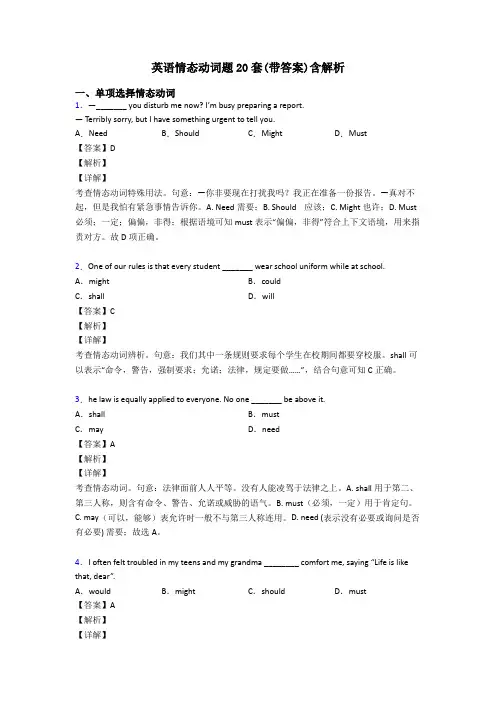
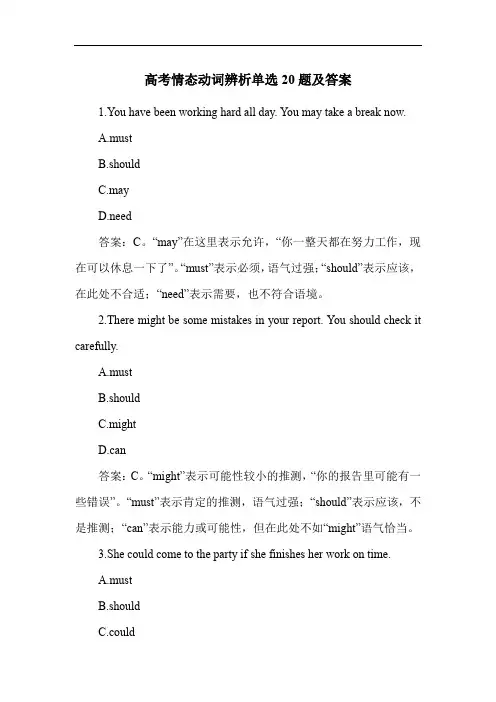
高考情态动词辨析单选20题及答案1.You have been working hard all day. You may take a break now.A.mustB.shouldC.mayD.need答案:C。
“may”在这里表示允许,“你一整天都在努力工作,现在可以休息一下了”。
“must”表示必须,语气过强;“should”表示应该,在此处不合适;“need”表示需要,也不符合语境。
2.There might be some mistakes in your report. You should check it carefully.A.mustB.shouldC.mightD.can答案:C。
“might”表示可能性较小的推测,“你的报告里可能有一些错误”。
“must”表示肯定的推测,语气过强;“should”表示应该,不是推测;“can”表示能力或可能性,但在此处不如“might”语气恰当。
3.She could come to the party if she finishes her work on time.A.mustB.shouldC.could答案:C。
“could”在这里表示一种可能性,“如果她按时完成工作,她可能会来参加聚会”。
“must”表示必须;“should”表示应该;“would”表示过去的意愿或虚拟语气,都不符合语境。
4.The weather may change suddenly. We'd better take an umbrella.A.mustB.shouldC.mayD.need答案:C。
“may”表示可能,“天气可能会突然变化,我们最好带把伞”。
“must”表示必须,太绝对;“should”表示应该,没有“may”表达的可能性恰当;“need”表示需要,不合语境。
5.He might not remember your name. Don't be surprised.A.mustn'tB.shouldn'tC.might notD.can't答案:C。
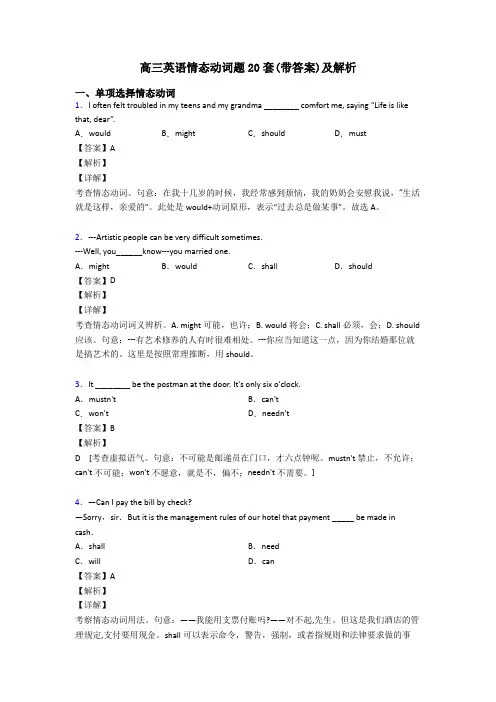
高三英语情态动词题20套(带答案)及解析一、单项选择情态动词1.I often felt troubled in my teens and my grandma ________ comfort me, saying “Life is like that, dear”.A.would B.might C.should D.must【答案】A【解析】【详解】考查情态动词。
句意:在我十几岁的时候,我经常感到烦恼,我的奶奶会安慰我说,“生活就是这样,亲爱的”。
此处是would+动词原形,表示“过去总是做某事”。
故选A。
2.---Artistic people can be very difficult sometimes.---Well, you______know---you married one.A.might B.would C.shall D.should【答案】D【解析】【详解】考查情态动词词义辨析。
A. might可能,也许;B. would将会;C. shall必须,会;D. should 应该。
句意:---有艺术修养的人有时很难相处。
---你应当知道这一点,因为你结婚那位就是搞艺术的。
这里是按照常理推断,用should。
3.It ________ be the postman at the door. It's only six o'clock.A.mustn't B.can'tC.won't D.needn't【答案】B【解析】D[考查虚拟语气。
句意:不可能是邮递员在门口,才六点钟呢。
mustn't 禁止,不允许;can't 不可能;won't 不愿意,就是不,偏不;needn't 不需要。
]4.—Can I pay the bill by check?—Sorry,sir.But it is the management rules of our hotel that payment _____ be made in cash.A.shall B.needC.will D.can【答案】A【解析】【详解】考察情态动词用法。
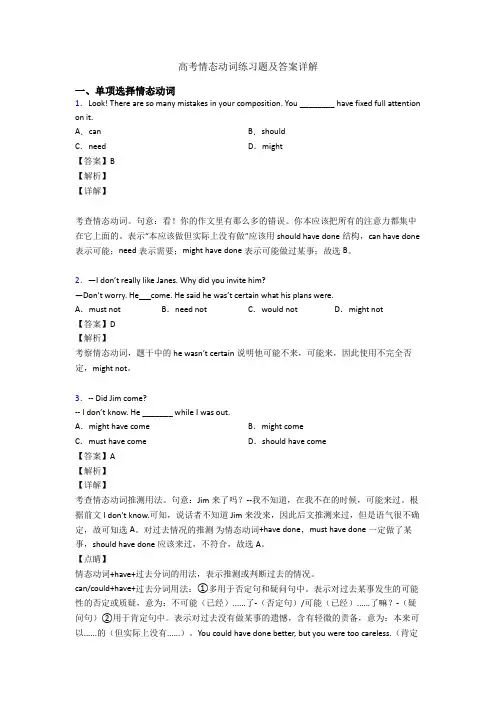
高考情态动词练习题及答案详解一、单项选择情态动词1.Look! There are so many mistakes in your composition. You ________ have fixed full attention on it.A.can B.shouldC.need D.might【答案】B【解析】【详解】考查情态动词。
句意:看!你的作文里有那么多的错误。
你本应该把所有的注意力都集中在它上面的。
表示“本应该做但实际上没有做”应该用should have done结构,can have done 表示可能;need表示需要;might have done表示可能做过某事;故选B。
2.—I don’t really like Janes. Why did you invite him?—Don’t worry. He come. He said he was’t certain what his plans were.A.must not B.need not C.would not D.might not【答案】D【解析】考察情态动词,题干中的h e wasn’t certain说明他可能不来,可能来,因此使用不完全否定,might not。
3.-- Did Jim come?-- I don’t know. He _______ while I was out.A.might have come B.might comeC.must have come D.should have come【答案】A【解析】【详解】考查情态动词推测用法。
句意:Jim来了吗?--我不知道,在我不在的时候,可能来过。
根据前文I don’t know.可知,说话者不知道Jim来没来,因此后文推测来过,但是语气很不确定,故可知选A。
对过去情况的推测为情态动词+have done,must have done 一定做了某事,should have done 应该来过,不符合,故选A。
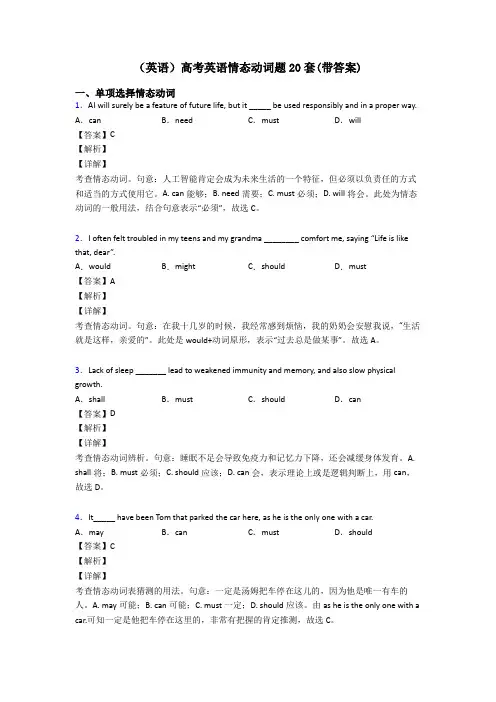
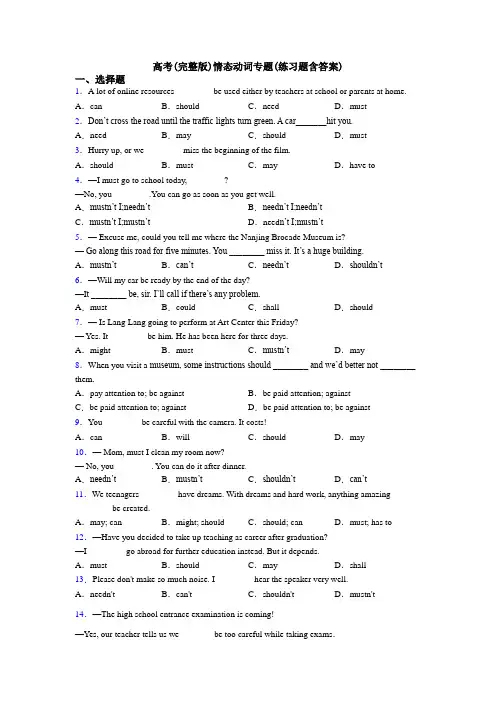
高考(完整版)情态动词专题(练习题含答案)一、选择题1.A lot of online resources ________ be used either by teachers at school or parents at home. A.can B.should C.need D.must2.Don’t cross the road until the traffic lights turn green. A car_______hit you.A.need B.may C.should D.must3.Hurry up, or we ________ miss the beginning of the film.A.should B.must C.may D.have to4.—I must go to school today, ________?—No, you ________.You can go as soon as you get well.A.mustn’t I;needn’t B.needn’t I;needn’tC.mustn’t I;mustn’t D.need n’t I;mustn’t5.— Excuse me, could you tell me where the Nanjing Brocade Museum is?—Go along this road for five minutes. You ________ miss it. It’s a huge building. A.mustn’t B.can’t C.needn’t D.shouldn’t 6.—Will my car be ready by the end of the day?—I t ________ be, sir. I’ll call if there’s any problem.A.must B.could C.shall D.should7.— Is Lang Lang going to perform at Art Center this Friday?— Yes. It ________ be him. He has been here for three days.A.might B.must C.mustn’t D.may8.When you visit a museum, some instructions should ________ and we’d better not ________ them.A.pay attention to; be against B.be paid attention; againstC.be paid attention to; against D.be paid attention to; be against9.You ________ be careful with the camera. It costs!A.can B.will C.should D.may10.— Mom, must I clean my room now?— No, you ________. You can do it after dinner.A.needn’t B.mustn’t C.shouldn’t D.can’t11.We teenagers ________ have dreams. With dreams and hard work, anything amazing________ be created.A.may; can B.might; should C.should; can D.must; has to 12.—Have you decided to take up teaching as career after graduation?—I ________ go abroad for further education instead. But it depends.A.must B.should C.may D.shall 13.Please don't make so much noise. I ________ hear the speaker very well.A.needn't B.can't C.shouldn't D.mustn't 14.—The high school entrance examination is coming!—Yes, our teacher tells us we _______ be too careful while taking exams.A.mustn't B.shouldn't C.needn't D.can't15.You ______ pay too much attention to your pronunciation, as it is so important in the oral (口头的) test.A.shouldn’t B.mustn’t C.can’t D.needn’t 16.—Would you please________in that way? That’s not safe!—Sorry. I won’t do it any more.A.not driving B.not to drive C.no driving D.not drive 17.Dr. Zhong Nanshan once said, "To prevent the spread of this disease, we________never be too careful."A.can B.may C.must D.should18.—Will your mother be at home this Saturday?—Hard to say. She _______go to the countryside to see my grandparents.A.must B.may C.can D.would19.Think twice before making a decision, or you __________ get into trouble.A.may B.can't C.shouldn't D.mustn't20.I ________ hear you clearly. Would you please repeat it?A.mustn’t B.can’t C.needn’t D.shou ldn’t 21.Look at the floor, Tom! ________ you watch TV while having a meal?A.Should B.Could C.Must D.May22.You _________ smoke here! Look at the sign. It says "No smoking".A.needn't B.mustn't C.can D.may23.— Listen! Tom ________ be listening to the music while doing his homework.—Let’s go upstairs to remind him to turn it off.A.should B.could C.would D.must24.—Will Jim come to Yangzhou for a holiday?—He ________come and it depends on how much homework he will have.A.may B.should C.must D.need25.—In China, many parents complain that their children have to stay up late to do the homework.—Don’t worry. The government has realized the problem. I’m sure there ________ be good news soon.A.can B.should C.need D.must26.I think all the students love the weekends because, to them, they ________ get up early on Saturdays or Sundays.A.mustn’t B.don’t need C.needn’t D.can’t27.When people are waiting at the zebra crossing, cars and buses ________ wait and let them go first.A.must B.may C.can D.need28.—Shall I tell him the change of the time right now?—I’m afraid you ________, otherwise he will be late for the meeting.A.can B.may C.must D.need29.It’s of great importance to protect the environment. Each of us ________ take an active part in it.A.can B.may C.would D.should 30.—Must we stop the Japanese government discharging nuclear waste water (排放核污水) into the Pacific Ocean?—________. Because everyone should protect our earth and it is bad ________ us to eat the polluted seafood and drink the waste water.A.Yes, we can; of B.No, we mustn’t; of C.Yes, we must; for D.No, we needn’t; for 31.According to the rule, used batteries ________ be dropped in the red bin for harmful wastes. A.may B.would C.should D.might32.Cars ________ give way to walkers on some roads in Binhai, or the drivers will be fined. A.may B.will C.can D.must33.Mr. Black ________ be at home now. He went abroad on vacation last Friday.A.can’t B.mustn’t C.needn’t D.shouldn’t 34.—How beautiful the winter jasmines (迎春花) are!—Yes. These golden-yellow flowers ________ be widely seen in my city in March.A.must B.can C.would D.should35.— What do you think of the show yesterday?— Some of them were really good but others ________ be better.A.will B.must C.need D.can 36.—Who’s the man over ther e? Is that Mr. Black?—It ________ be him. Mr. Black is much taller than that man.A.may B.must C.can’t D.mustn’t37.—________ I see your ID card? We have to check your personal information.—Sure. Here you are.A.May B.Need C.Should D.Must38.—I don’t care what people think.—Well, you _______ . Some opinions are worth weighing.A.should B.might C.could D.would39.—I think they are enough. We ________ make so many chairs.—I don’t think so. Because nearly a quarter of them need ________.A.don’t need to; mending B.needed; to be mendedC.don’t need; mend D.need; to mend40.—Seventy dollars for such a dress! You ________ be joking!—I’m serious. It’s made of silk from Hangzhou.A.must B.need C.will D.can【参考答案】一、选择题1.A解析:A【详解】句意:很多在线资源既可以供学校的老师使用,也可以供家长在家使用。
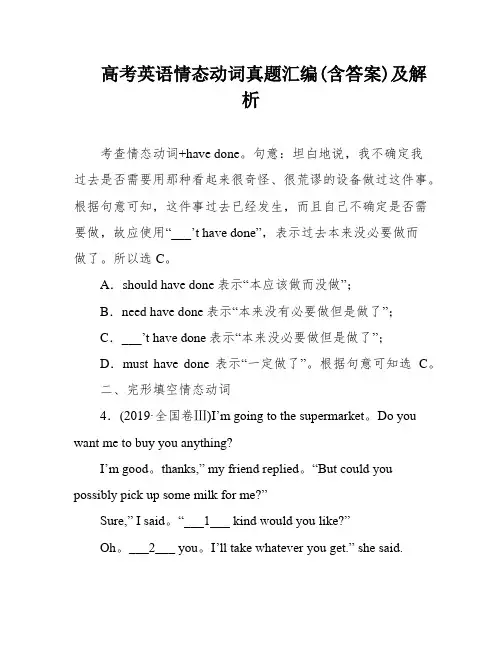
高考英语情态动词真题汇编(含答案)及解析考查情态动词+have done。
句意:坦白地说,我不确定我过去是否需要用那种看起来很奇怪、很荒谬的设备做过这件事。
根据句意可知,这件事过去已经发生,而且自己不确定是否需要做,故应使用“___’t have done”,表示过去本来没必要做而做了。
所以选C。
A.should have done表示“本应该做而没做”;B.need have done表示“本来没有必要做但是做了”;C.___’t have done表示“本来没必要做但是做了”;D.must have done表示“一定做了”。
根据句意可知选C。
二、完形填空情态动词4.(2019·全国卷Ⅲ)I’m going to the supermarket。
Do you want me to buy you anything?I’m good。
thanks,” my friend replied。
“But could you possibly pick up some milk for me?”Sure,” I said。
“___1___ kind would you like?”Oh。
___2___ you。
I’ll take whatever you get.” she said.I ___3___ the supermarket and picked up a gallon of milk。
When I got to the checkout。
I ___4___ that the line was long and there was only one cashier working。
I ___5___ my head and sighed。
___6___ that it was going to take a while.Just as I was about to ___7___ the line。
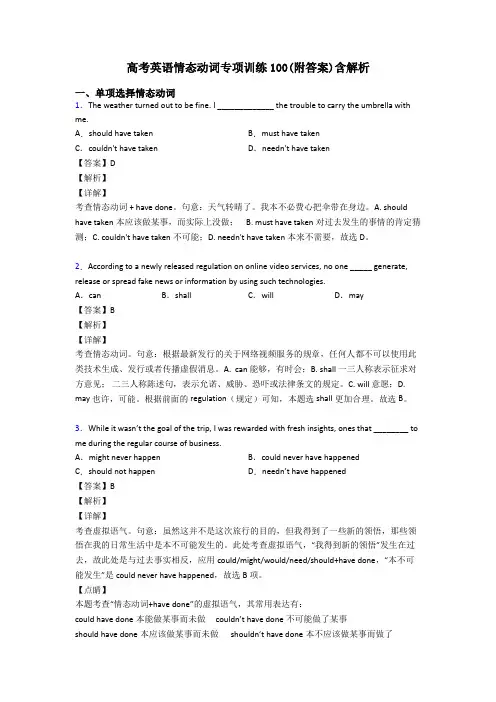
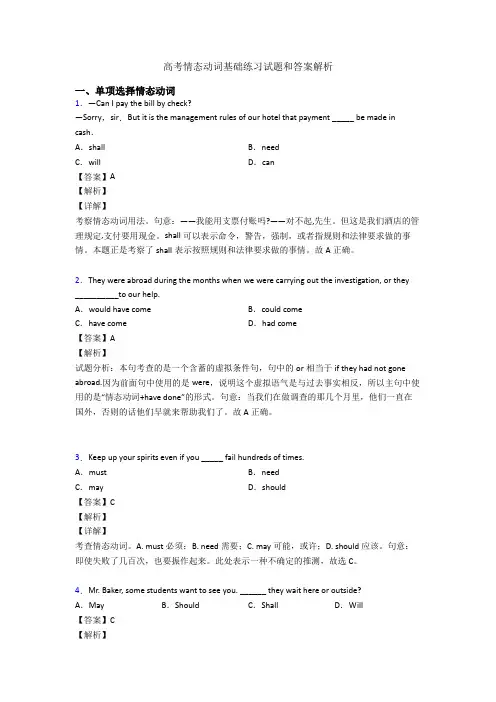
高考情态动词基础练习试题和答案解析一、单项选择情态动词1.—Can I pay the bill by check?—Sorry,sir.But it is the management rules of our hotel that payment _____ be made in cash.A.shall B.needC.will D.can【答案】A【解析】【详解】考察情态动词用法。
句意:——我能用支票付账吗?——对不起,先生。
但这是我们酒店的管理规定,支付要用现金。
shall可以表示命令,警告,强制,或者指规则和法律要求做的事情。
本题正是考察了shall表示按照规则和法律要求做的事情。
故A正确。
2.They were abroad during the months when we were carrying out the investigation, or they __________to our help.A.would have come B.could comeC.have come D.had come【答案】A【解析】试题分析:本句考查的是一个含蓄的虚拟条件句,句中的or相当于if they had not gone abroad.因为前面句中使用的是were,说明这个虚拟语气是与过去事实相反,所以主句中使用的是“情态动词+have done”的形式。
句意:当我们在做调查的那几个月里,他们一直在国外,否则的话他们早就来帮助我们了。
故A正确。
3.Keep up your spirits even if you _____ fail hundreds of times.A.must B.needC.may D.should【答案】C【解析】【详解】考查情态动词。
A. must必须;B. need需要;C. may可能,或许;D. should应该。
句意:即使失败了几百次,也要振作起来。
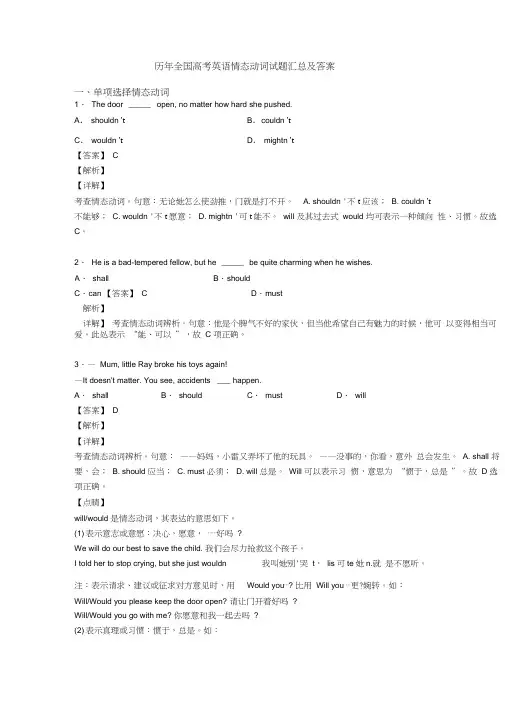
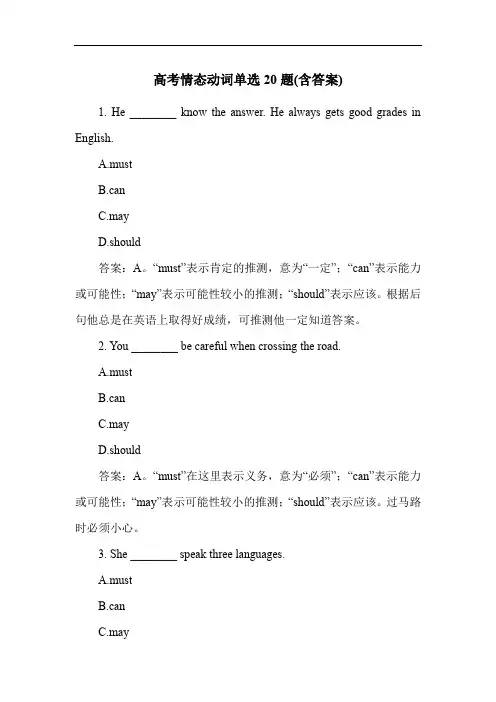
高考情态动词单选20题(含答案)1. He ________ know the answer. He always gets good grades in English.A.mustB.canC.mayD.should答案:A。
“must”表示肯定的推测,意为“一定”;“can”表示能力或可能性;“may”表示可能性较小的推测;“should”表示应该。
根据后句他总是在英语上取得好成绩,可推测他一定知道答案。
2. You ________ be careful when crossing the road.A.mustB.canC.mayD.should答案:A。
“must”在这里表示义务,意为“必须”;“can”表示能力或可能性;“may”表示可能性较小的推测;“should”表示应该。
过马路时必须小心。
3. She ________ speak three languages.A.mustB.canC.may答案:B。
“can”表示能力,意为“能够”;“must”表示肯定的推测或义务;“may”表示可能性较小的推测;“should”表示应该。
她能说三种语言,强调能力。
4. He ________ come to the party. He said he was busy.A.mustn'tB.can'tC.may notD.shouldn't答案:B。
“can't”表示否定的推测,意为“不可能”;“mustn't”表示禁止;“may not”表示可能性较小的否定推测;“shouldn't”表示不应该。
他说他很忙,所以不可能来参加聚会。
5. We ________ study hard to get good grades.A.mustB.canC.mayD.should答案:A。
“must”表示义务,意为“必须”;“can”表示能力或可能性;“may”表示可能性较小的推测;“should”表示应该。
高考情态动词练习20题1. Tom be at home. I just saw him go out.A.mustn'tB.can'tC.needn'tD.shouldn't答案解析:B。
“can't”表示“不可能”,符合语境,因为刚刚看到汤姆出去了,所以他不可能在家。
“mustn't”表示“禁止”;“needn't”表示“不必”;“shouldn't”表示“不应该”,这三个选项都不符合题意。
2. You have finished your homework before you watch TV.A.mustB.canC.mayD.need答案解析:A。
“must”表示“必须”,符合题意,即你必须先完成作业才能看电视。
“can”表示“能够”;“may”表示“可以”;“need”表示“需要”,这三个选项都不能准确表达该语境下的义务。
3. She speak three languages fluently.A.mustB.canC.shouldD.need答案解析:B。
“can”表示“能够”,在这里表示她能够流利地说三种语言。
“must”表示“必须”,不符合语境;“should”表示“应该”;“need”表示“需要”,这两个选项也不合适。
4. I be wrong, but I think he is from Canada.A.mayB.mustC.shouldD.need答案解析:A。
“may”表示“可能”,符合语境,即我可能是错的。
“must”表示“一定”,语气太肯定;“should”表示“应该”;“need”表示“需要”,都不符合该语境。
5. You go to school on foot. It's not far.A.mustB.canC.shouldD.need答案解析:B。
“can”表示“可以”,在这里表示你可以步行去上学,因为不远。
高考情态动词练习题及配套参考答案一、单项选择情态动词1.You ________ give me a lift. I want to walk home for exercise.A.needn’t B.couldn’t C.can’t D.mustn’t【答案】A【解析】【详解】考查情态动词。
句意:你不必让我搭车。
我想步行回家锻炼身体。
A. needn’t不必;B. couldn’t不能;C. can’t不会;D. mustn’t禁止,不允许。
根据I want to walk home for exercise.可知,你不必让我搭车。
故选A。
考点:考查情态动词2.—I don’t really like Janes. Why did you invite him?—Don’t worry. He come. He said he was’t certain what his plans were.A.must not B.need not C.would not D.might not【答案】D【解析】考察情态动词,题干中的he wasn’t certain说明他可能不来,可能来,因此使用不完全否定,might not。
3.Keep up your spirits even if you _____ fail hundreds of times.A.must B.needC.may D.should【答案】C【解析】【详解】考查情态动词。
A. must必须;B. need需要;C. may可能,或许;D. should应该。
句意:即使失败了几百次,也要振作起来。
此处表示一种不确定的推测,故选C。
4.Using AI, many companies are now conducting experiments that__________ possible just a few years ago.A.would have been B.might have beenC.shouldn't have been D.couldn't have been【答案】D【解析】【详解】考查情态动词表推测。
高考英语情态动词练习题50题(带答案)1. You ______ be tired after working for eight hours without a break.A. canB. mayC. mustD. should答案解析:C。
must表示肯定的推测,根据题意,连续工作八小时不休息肯定会累,所以这里用must。
A选项can表示能力或可能性,通常用于否定句和疑问句中表示推测,这里不符合语境。
B选项may表示可能,可能性较弱,没有must肯定。
D选项should表示应该,与题意推测累不累不相关。
2. - ______ I use your pen? - Sure. Here you are.A. MustB. MayC. NeedD. Should答案解析:B。
May用于征求对方许可,在这个句子中是询问是否可以使用对方的笔,符合语境。
A选项Must表示必须,C选项Need 表示需要,D选项Should表示应该,都不符合这个征求许可的语境。
3. He ______ speak English when he was five years old.A. couldB. canC. mayD. must答案解析:A。
could是can的过去式,表示过去的能力,句中提到他五岁的时候,是过去的时间,所以用could表示过去能说英语。
B选项can表示现在的能力。
C选项may表示可能,D选项must表示肯定的推测,都不符合这里表示过去能力的语境。
4. - Where is Tom? - He ______ be in the library. I'm not sure.A. canB. mayC. mustD. should答案解析:B。
may表示可能性,根据I'm not sure可知说话者不确定,只是一种可能,所以用may。
A选项can用于否定句和疑问句中表示推测,这里是肯定句。
高考英语情态动词试题(有答案和解析)一、单项选择情态动词1.It wasn’t right to me that such near neighbors not know one another.A.could B.wouldC.should D.might【答案】C【解析】【详解】考查情态动词。
句意:对我来说,很不正常,如此近的邻居居然不认识。
A. could可能,能够;B. would将;C. should竟然;D. might可能,也许。
should 作为情态动词,可以用来表示意外、惊喜或者在说话人看来是不可思议的,常常译为"竟会"、"居然",住的这么近的邻居居然不认识。
表示意外,所以答案选C。
【点睛】should的用法1、should 作为情态动词,通常用来表示现在或将来的责任或义务,译作“应该”、“应当”,这时它可以和 ought to, be supposed to 互换使用.例如:You should (= ought to ) tell your mother about it at once.2、should 作为情态动词,可以用在条件状语从句中,表示语气较强的假设,译作“万一”、“竟然”,这时也可将 should 置于从句之首,即将 should 放在主语前面,而省略从属连词 if。
例如:If you should fail to come, ask Mrs Chen to work in your place. (= Should you fail to come, ask Mrs Chen to work in your place. )3、should 作为情态动词,可以表示谦逊、客气、委婉之意,译为“可……”、“倒……”。
例如:I should say that it would be better to try it again.4、should 作为情态动词,可以用来表示意外、惊喜或者在说话人看来是不可思议的.尤其在以 why, who, how 等开头的修辞疑问句或某些感叹句中常常译为“竟会”、“居然”。